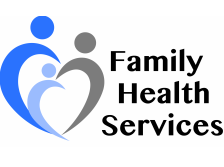Diabetes News – February 2022
February is National American Heart Month
Heart disease is the leading cause of death for both men and women in the United States. As of 2018, 30.3 million U.S. adults were diagnosed with heart disease. Every year, about 647,000 Americans die from heart disease, making it the leading cause of death in the United States. Heart disease causes 1 out of every 4 deaths. To help prevent heart disease and increase awareness of its effects, Family Health Services is proudly participating in American Heart Month. Source: healthline.com
What is the link between diabetes, heart disease, and stroke?
Over time, high blood glucose from diabetes can damage your blood vessels and the nerves that control your heart and blood vessels. The longer you have diabetes, the higher the chances that you will develop heart disease.
People with diabetes tend to develop heart disease at a younger age than people without diabetes. In adults with diabetes, the most common causes of death are heart disease and stroke. Adults with diabetes are nearly twice as likely to die from heart disease or stroke as people without diabetes.
The good news is that the steps you take to manage your diabetes also help to lower your chances of having heart disease or stroke. To lower your risk:
Manage your diabetes ABCs
Knowing your diabetes ABCs will help you manage your blood glucose, blood pressure, and cholesterol. Stopping smoking and maintaining a healthy weight if you have diabetes is also important to lower your chances for heart disease.
A is for the A1C test. The A1C test shows your average blood glucose level over the past 3 months. This is different from the blood glucose checks that you do every day. The higher your A1C number, the higher your blood glucose levels have been during the past 3 months. High levels of blood glucose can harm your heart, blood vessels, kidneys, feet, and eyes.
The A1C goal for many people with diabetes is below 7 percent. Some people may do better with a slightly higher A1C goal. Ask your health care team what your goal should be.
B is for blood pressure. Blood pressure is the force of your blood against the wall of your blood vessels. If your blood pressure gets too high, it makes your heart work too hard. High blood pressure can cause a heart attack or stroke and damage your kidneys and eyes.
The blood pressure goal for most people with diabetes is below 140/90 mm Hg. Ask what your goal should be.
C is for cholesterol. You have two kinds of cholesterol in your blood: LDL and HDL. LDL or “bad” cholesterol can build up and clog your blood vessels. Too much bad cholesterol can cause a heart attack or stroke. HDL or “good” cholesterol helps remove the “bad” cholesterol from your blood vessels.
Ask your health care team what your cholesterol numbers should be. If you are over 40 years of age, you may need to take medicine such as a statin to lower your cholesterol and protect your heart. Some people with very high LDL (“bad”) cholesterol may need to take medicine at a younger age.
S is for stop smoking. Not smoking is especially important for people with diabetes because both smoking and diabetes narrow blood vessels, so your heart has to work harder.
Since this month is all about the heart, let’s talk about something you are going to love (and it’s good for you).
The Diet-Betus – our version of recipe of the month just with a healthier tweak
Southwest Breakfast Quiche
Ingredients
• nonstick cooking spray
• 3 eggs
• ¼ C whole wheat flour
• ½ tsp baking powder
• ½ C egg whites or egg substitute
• ¼ C skim milk
• 7 oz canned green chiles
• 1 C fat free cottage cheese (whipped in a food processor until smooth)
• 1 C reduced fat shredded cheddar cheese
DIRECTIONS
1. Preheat oven to 400º F. Coat a 9-inch round or square baking dish with canola cooking spray; set aside.
2. In mixer bowl, combine eggs, flour, and baking powder, and beat until blended. Add egg whites and milk and beat until smooth. On low speed, beat in green chilis, cottage cheese and shredded cheese.
3. Pour mixture into prepared dish and bake for 15 minutes. Reduce heat to 350-degrees and bake for about 25 minutes more (until quiche is firm in the center and top is golden brown). Cut into 6 equal slices and serve as is or top with salsa, avocado or plain Greek yogurt. Source: https://www.diabetesfoodhub.org
Community offerings: *
* Due to coronavirus/COVID 19, many community offerings have been changed, postponed, or canceled.
Please call the number listed for the event to verify availability, dates, and times.
If you have questions regarding Coronavirus/COVID-19 please call 1-833-4-ASK-ODH (1-833-427-5634)Or, go to https://www.cdc.gov/coronavirus/2019-nCoV/index.html or https://coronavirus.ohio.gov/wps/portal/gov/covid-19/.
Diabetes Empowerment Education Program (DEEP)
COST: Free
CONTACT: Tina Elmlinger 419-624-1856
The Diabetes Empowerment Education Program [DEEP] is offered every Wednesday for six weeks. Good attendance is important. This free program is for diabetics, pre-diabetics, and spouses or caregivers of a diabetic. Residents of Erie County, aged 60 or older, please call 419-624-1856 to register.
Diabetes Support Group – Firelands Regional Medical Center
The Diabetes Support Group presented by Jean Feick CNP, CDE, meets the third Wednesday of each month Sept–November and January-May from 12:00pm –1:00pm. This meeting is free to the public and no registration is required. Attendees are welcome to purchase lunch in the hospital cafeteria and come to the adjacent Cafeteria Meeting #1. A different topic will be reviewed each month. If you have questions, please contact the Diabetes Education Department at 419-557-6992.
HEALTH & WELLNESS SCREENING
offered by Firelands Regional Medical Center
You must Pre-register for all Lab Work at 419-557-7840.
Sandusky Health & Wellness
Firelands Regional Medical Center South Campus
1912 Hayes Avenue Sandusky, OH
7:00 am -9:30 am on the following dates:
- Saturday, February 19
- Saturday, March 12
- Saturday, April 9
- Saturday, May 14
Health & Wellness Screenings include:
• Complete Blood Count with Metabolic & Lipid Panel (No Eating or Drinking for 12 Hours – Water Allowed – includes liver and kidney function studies, fasting blood sugar, thyroid, cholesterol, HDL/LDL, and triglyceride levels along with a complete blood count.) – $45.
• Hemoglobin A1C (A three-month report card on how well your blood sugars have been running. A test used to diagnose diabetes and/or to evaluate how well your treatment plan is working.) – $25.
• PSA (Prostate Specific Antigen)- $30.
• Vitamin D – $35.
• TSH – $25
Please comply with the following COVID-19 precautions:
• Wear a mask
• Have your temperature taken upon arrival
• Follow social distancing practices
Please note
• Patients will not be allowed to enter until their scheduled time
• Walk-ins will not be accepted
• Only the registered patient will be allowed to enter the screening unless the patient needs assistance from an accompanying person
• We are unable to perform any additional physician-ordered tests not included in the list above.
Contact: Centralized Scheduling at 419-557-7840 to pre-register
The A1C test—also known as the hemoglobin A1C or HbA1c test—is a simple blood test that measures your average blood sugar levels over the past 3 months. It’s one of the commonly used tests to diagnose prediabetes and diabetes, and is also the main test to help you and your health care team manage your diabetes. Higher A1C levels are linked to diabetes complications, so reaching and maintaining your individual A1C goal is really important if you have diabetes.
Last quarter, 68% of our diabetic patients had an A1C of less than 9%. Talk with your provider to discuss the right options for you.



